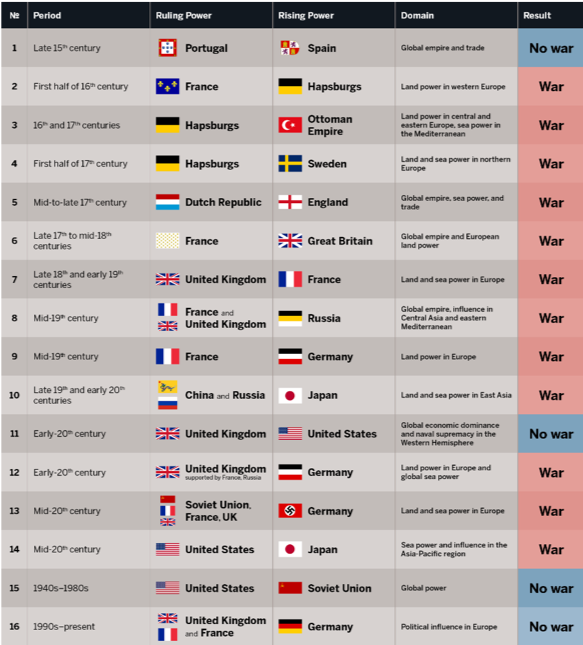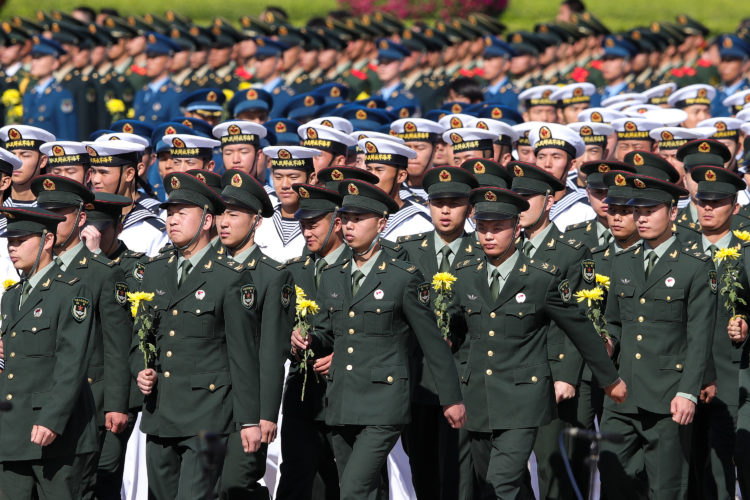The world is changing. For many of us, our lives have been dominated by the bipolar rigid competition of the Cold War and the global growth and stability of American hegemony following the collapse of the Soviet Union. The current environment is beginning to look much less stable. There is a resurgence of Great Power Politics around the world, with Russia attempting to convince the world of its strength and China rising in economic, military, and technological capability. The changes in the balance of power have led some to predict a possible war between the U.S. and China in the near future. The U.S. is the current superpower on the world stage, but China is a rising power, potentially threatening the U.S. position. This creates a classic example of what’s known as Thucydides’s Trap.
The ancient Greek historian Thucydides wrote “The History of the Peloponnesian War,” which chronicled the conflict between the great power of the time, Sparta, and the rising power of Athens. Thucydides wrote, “The growth of the power of Athens, and the alarm which this inspired in Lacedaemon [Sparta], made war inevitable.” Thus, Thucydides Trap is when a rising power causes fear in an established power which escalates toward war.
Professor Graham Allison, of the Harvard Kennedy School, is raising awareness of the historical validity of Thucydides’s Trap and the role it plays in current U.S./China relations. Professor Allison, with the school’s Belfer Center for Science and International Affairs, is conducting an ongoing case file covering the previous 500 years of world history which has identified previous instances of Thucydides’s Trap. It chronicles 16 instances in which a rising power has challenged the authority of an existing global power. Of these 16 instances, 12 have resulted in war between the two powers. Only a quarter of all historical instances of Thucydides’s Trap ended in a peaceful transition of power.

The numerous instances of war provide some insight into the actions and belligerence which fostered distrust and conflict, however, the limited instances resulting in peace may help provide a picture of how to move forward. Great power conflict, as last seen in World War II, results in global bloodshed and suffering. The examples where war did not break out could provide insight into how the two powers may resolve their growing security dilemma.
The first example where Thucydides’s Trap was avoided involved Portugal and Spain during the 15th century. Portugal was the dominant European exploratory empire of the time. Spain only managed to unite the kingdom and expel the Moors from the Iberian Peninsula in 1492, the same year it funded the exploration of Christopher Columbus. Portugal and Spain had already fought one war to a standstill in the middle of the 15th century. The prospect of fighting another war did not seem economically or militarily advantageous to either side. The conflict was resolved through an appeal to a supranational power–that of the Catholic Church. The pope helped to negotiate the Treaty of Tordesillas, which split the world in half along the 46th meridian for the conquest of the two sides. Ultimately, neither side wanted another costly war and neither monarch would risk excommunication from the Church for violating the terms of the treaty.
The next example of a peaceful outcome does not surface until over 400 years later. The beginning of the 20th century marked the twilight years of the Pax Britannica or the British Peace which began after the defeat of Napoleon, and lasted for 100 years guaranteed by the strength of the British Imperial Navy. At that time, there was still negative sentiment on the part of America against England. It was less than 100 years since the war of 1812 and the U.S. and Britain did not hold each other as valuable allies yet. American economic power was already dominating the world and still growing. Additionally, the U.S. was expanding and modernizing its navy and exercising diplomatic influence over all of the Western Hemisphere. The U.S. was expanding so fast, the British could not keep up and there was talk of war on both sides. England chose instead to cede influence over the Americas to the U.S. and focus on the growing troubles of Europe, with many hoping to find an eventual ally in the U.S. when war inevitably broke out. This “Great Rapprochement” helped to heal relations between the growing power of the U.S. and its previous empirical overlord, resulting in the U.S. eventually joining Britain in defending their commonly held beliefs of freedom through two separate World Wars.
The third escape from the trap was much narrower. The Cold War between the United States and the Soviet Union did not end in apocalyptic war, however, it was not a pleasant period either. The U.S. came out of WWII as a clear superpower, however, the USSR’s economy rebounded quickly and began to challenge U.S. hegemony. The two powers competed for influence around the world through the space race, and even in several proxy wars. Still, the two powers never engaged in direct warfare, which is largely credited to the complete annihilation promised by a nuclear conflict. By the 1980s, the United States had proved to the world that free markets provided greater economic advantage over the planned markets of communism and the United States ramped up military spending threatening the Soviet Union. Eventually, the USSR could not maintain its military industrial complex while also providing necessities for its citizens. The communist experiment crumbled away first with the fall of the Berlin Wall in 1989, then with the collapse of the USSR itself in 1991.
The final escape involved the reunification of Germany following the fall of the Soviet Union. The unexpected end to the Cold War quickly changed the global landscape and suddenly Britain and France faced the challenge of a reunified Germany–which would again be the strongest land power in Europe. Leaders of Britain and France were nervous about the reemergence of this competitor. German leaders were aware of the threat they now posed to the other European powers and chose to be deliberate in their actions. They used their economic influence to garner political power, not to dominate Europe, but to fill to vacuum left by the USSR to unify the continent. They also chose to keep their military small, allowing the United States to remain a stabilizing security presence in their nation and on the European continent. The result was the eventual formation of the European Union.
Each of these four examples provides a different path by which Thucydides’s Trap was avoided. So, what do you think? Would either side ever listen to a supranational organization? Would the U.S. decide to cede control of Asia, as Britain did with the Americas, knowing that China does not have respect for liberty? Can the U.S. economically outmaneuver China as it did with the USSR? Would China be more deliberate and cautious with its words and actions in the future as it continues to grow in influence? Or is there another option by which the U.S. and China can avoid a future conflict?
Chime in on the discussion feed and let us know what you think the future could hold. Can the U.S. and China avoid war?
Written by NEWSREP guest writer Micah Olsen. Micah is a Reconnaissance man with more than 13 years in the United States Marine Corps, including combat deployments to Iraq and Afghanistan as well as theater security cooperation deployments in Latin America. He has a Bachelor of Science in Global Business from Embry-Riddle Aeronautical University and is continually seeking further educational opportunities. He currently lives in the Pacific Northwest where he is slowly remodeling a newly purchased home with his beautiful wife and their awesome dog.










COMMENTS